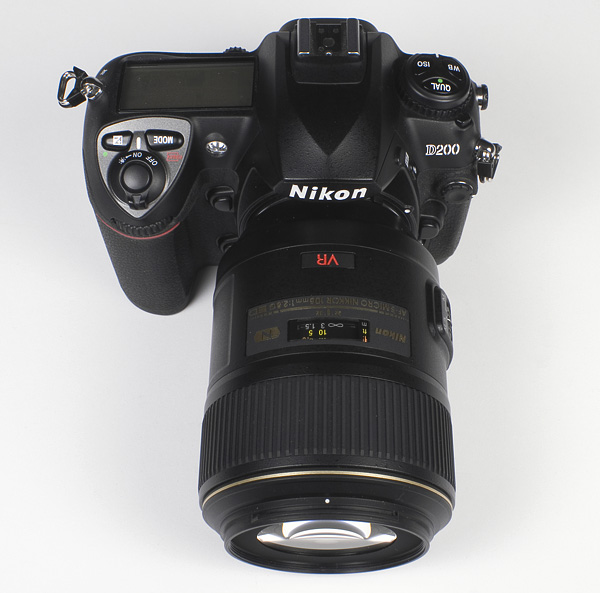|
Micro-Nikkor AF-S 105mm f/2.8G IF-ED VR - Review / Test Report |
|
Lens Reviews -
Nikon / Nikkor (APS-C)
|
|
Page 1 of 3
Review by Klaus Schroiff, published February 2007
Lens kindly provided for testing purposes by Friedrich Burgwedel (1st sample) and Peter-Cornelius Spaeth (2nd sample)!
Introduction
The Micro-Nikkor AF-S 105mm f/2.8G IF-ED VR is the latest addition to the Nikon macro
lens line-up (at the time of this review). It replaces the Micro-Nikkor AF 105mm f/2.8 D,
a dated but popular and highly-regarded lens. As usual we will have a look how the new lens
performs on an APS-C body (Nikon D200) where its field-of-field of the lens is equivalent to 158mm.

The Nikkor is a quite fat and heavy lens (see below). Compared to its predecessor
its diameter increased by 1cm plus 40% more weight. As such it is among the biggest of
its kind. As the name implies the Nikkor is a macro lens with a min. focus distance
of 0.31m resulting in a max. object magnification of 1:1 and a working distance
of min. ~15cm. At 1:1 the max. aperture decreases to f/4.8 which is a quite typical
characteristic for an IF (internal focusing) macro lens. The adjusted aperture value
is displayed in the viewfinder.

The build quality of the lens is very decent thanks to an outer
barrel made of metal. The broad, rubberized focus ring operates
quite smooth but it is not damped. Unlike its predecessor it is a "true" IF lens
so it does NOT extend during focusing - this is a seldom but very welcome
feature for a macro lens in this focal length class.
Typical for all IF lenses the front element does not rotate so using a
polarizer is no problem.

The AF-S 105mm f/2.8G IF-ED VR has a silent-wave AF drive which operates relatively
fast and virtually silent. The AF on the D200 seems a little prone to hunting with
this lens so it is generally a good idea to take advantage of the build-in focus
limiter when using the lens for non-macro purposes.
A new key feature of the lens is the single-mode VR II (vibration reduction) mechanism
with an efficiency equivalent to 4 f-stops towards infinity focus (claimed by Nikon).
An interesting new technology used in this lens is "Nano Crystal Coat" on the rear
optical element. NCC is supposed to eliminate internal lens reflections
(reads: less flare). There´s also a corresponding "N" logo printed on the lens.
| Specifications |
|---|
| Equiv. focal length | 157.5 mm (full format equivalent) |
| Equiv. aperture | f/4.2 (full format equivalent, in terms of depth-of-field) |
| Optical construction | 14 elements in 12 groups |
| Number of aperture blades | 9 (rounded) |
| min. focus distance | 0.31 m (max. magnification ratio 1:1) |
| Dimensions | 116 x 83 mm |
| Weight | 760 g |
| Filter size | 62 mm (non-rotating) |
| Hood | Nikon HB-38, petal-shaped (included), snap-on type |
| Other features | Nano Crystal Coating. Vibration reduction. Constant physical length (true IF design). Silent-wave AF motor. |
|